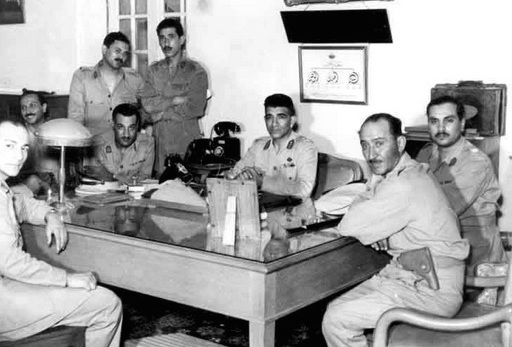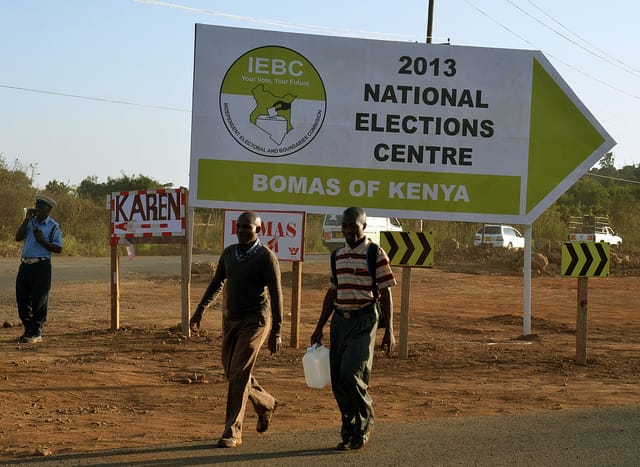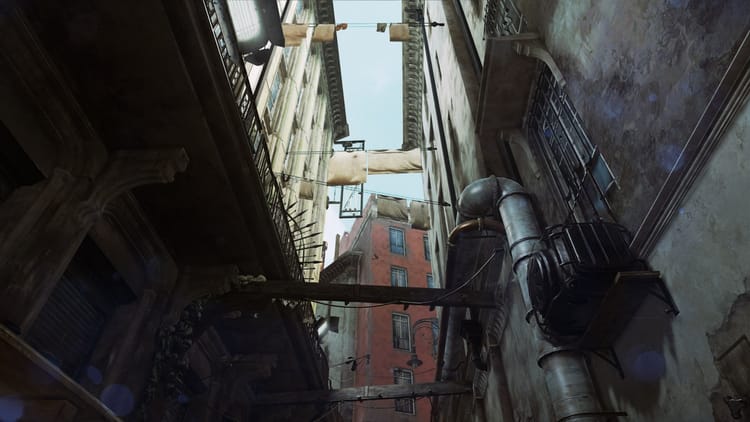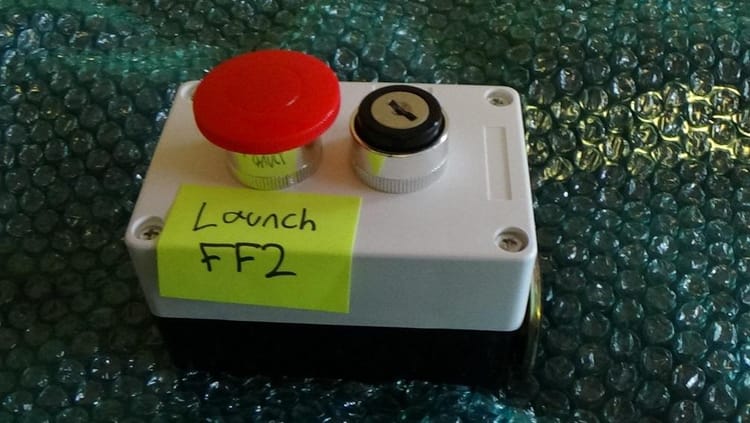The videogame that dares to tackle African politics

Videogames have a problem with how they portray Africa—the continent often appears as nothing more than a stereotypical warzone. The most egregious example is 2009’s Resident Evil 5, which included an unnamed African locale with a conspicuously incensed mob united under an unconvincing explanation of undeadness as an excuse for white protagonist Chris Redfield to shoot every local he sees. A more recent slight was the Call of Duty: Black Ops II (2012) mission” Pyrrhic Victory”, where combatants of the Angolan Civil War are portrayed as machete-wielding maniacs charging at each other in a dusty battlefield. The portrayal was so skewed that in February, the family of Jonas Savimbi, the inspiration for the supporting character featured in the level, sued Activision Blizzard for allegedly portraying the real-life rebel leader in a false light.
Fortunately, there are more recent efforts, such as Aurion: Legacy of the Kori-Odan, a crowdfunded game out of Cameroon, that seek to change the landscape and portray African culture on its own terms. However, two days after its release back in April, Democracy 3: Africa, an expandalone game for the Democracy series, also arrived. Notably, it is not made by an African studio as is the case with Aurion, it is made by a British one, called Positech Games. That makes it worth scrutinizing.
Videogames have a problem with how they portray Africa
Democracy 3: Africa places the player as a democratically-elected leader of various African countries including Egypt, Tunisia, South Africa, Nigeria, Senegal, Kenya, Ghana, and Botswana. The main play screen shows a grid of voting demographics surrounded by a web of circular nodes that represent policies and issues. These nodes relate to each other with flowing arrows that denote pull and push forces. Event triggers influence the effectiveness of these nodes, like a local author winning a book award or a plane crash.
The game diverts from the original Democracy 3 by including factors and challenges that developing countries face, such as desertification, food insecurity, gender discrimination, and female genital mutilation, alongside democratic policy factors common to the Democracy series. In interviews with ZAM, IGN Africa, and Kotaku, creators Cliff Harris and Jeff Davis have shown a keen awareness of the pitfalls of outsiders portraying Africa in a medium that struggles to portray African locales with respect and accuracy. Democracy 3: Africa’s potential role as an education tool (Positech offers educational licenses for Democracy 3) calls for further obligation to portray African countries credibly.

The overarching goal of the Democracy series is to govern by making policy decisions from a presidential office. The player must seek popular approval and votes for reelection by making decisions by turn, which represents a quarter year. Demographics that are deeply angry may form armed groups and try to assassinate the player, ending the game. Since Democracy 3: Africa measures women as dissatisfied due to endemic discrimination and conservative traditions such as female genital mutilation, the player is often opposed to by the militant women’s group Matriarchs of Justice. This is probably an unintended consequence of low starting approval for women and corresponding issues that negatively affect their opinion than an inspired statement about feminism.
With its focus on the executive branch of government, the Democracy series implies that liberal democratic institutions are the primary source of power in society. As someone that lives in the United States, I can barely argue with the practicality and grasp of constitutional power over society—as Philip K. Dick once said, “Reality is that which, when you stop believing in it, doesn’t go away.” However, in less developed, illiberal democratic states, other sources of power are more visible and real. Three factors greatly influence governance in the region: the influence of foreign aid on policy, the arrow of the military in the political sphere, and the ethnic identity of voters. A credible game about African governance should include these factors. And so I played Democracy 3: Africa and made radical decisions in an effort to get these factors to play out. I turned off assassinations so as not to be thwarted by radical groups, including the dreaded Matriarchs, or The Moral Crusade.
A credible game about African governance should include factors other than liberal democratic institutions
Since foreign aid is well documented, Democracy 3: Africa can credibly simulate the influence of foreign aid on African governance. A common form of aid during the late 80s and early 90s was a Structural Adjustment Program (SAP), a loan which required countries to adopt a policy, such as budget cuts, to continue receiving aid. These were offered to developing countries by the International Monetary Fund and World Bank. Critics of SAPs say that the lenders often advocate for cuts that hinder a country’s development and are often broad brush measures that don’t account for differences in economies. Supporters say SAPs help develop a country’s private sector, balance state budgets, and reduce government corruption. The term has fallen out of favor, but austerity measures enacted across Europe this decade follow the same logic.
Democracy 3: Africa represents this in the node Foreign Aid Received. It is influenced by the nodes Human Development, GDP, and revenue administration. The new policy called foreign aid petitioning also influences aid received. I didn’t see any indications of budget stipulations as a condition of continuing foreign aid. The game represents this as a “softer” push and pull force instead of overt mandates and conditions that the SAPs represented. The game seems to portray foreign lenders as another stakeholder in governance instead of top-down creditors.
The military is a pernicious influence on democratic politics in places like Egypt, Nigeria, and Ghana. 67 attempted or successful coups occurred among 54 countries in Africa between 1990 and 2012. Egypt is a recent example of military intervention on democratic governance. Since the overthrow of King Farouk in 1952, Egypt has been overseen by a faction of senior military officers—the Supreme Council of the Armed Forces. Six of the nine presidents of Egypt came from the Egyptian military’s officer corps.

Egyptian Free Officers, the precursor to the SCAF, in 1953 via Wikimedia Commons
The 2011 Egyptian revolution sought the overthrow of military-appointed president Hosni Mubarak who had ruled since 1981. When Mubarak resigned, the SCAF took over and oversaw the 2012 presidential election. Voters chose Mohammad Morsi of the Freedom and Justice Party, affiliated with the historic Islamist party Muslim Brotherhood. Instability and violence during Morsi’s presidency compelled the SCAF to depose and arrest Morsi in 2013. With the sanction of the SCAF, Abdel Fattah el-Sisi took the presidency in 2013. Al-Sisi went on to win the 2014 Egyptian presidential election.
Military intervention appears as a factor in Democracy 3: Africa’s web, influenced by stability and military spending, and pushes against democracy factor as well. When playing Egypt, I tried to decrease stability and raise military spending to elicit a military response to my presidency. With assassination turned off in the options screen, I was insulated from the blowback of decreased public approval. After a few tries, I looked at the code and found that Military State was an achievement, but didn’t elicit a coup. The game seems to think a president is more likely to be assassinated by a militant feminist group than deposed by a military junta. The former is extremely unlikely, while the latter happens frequently.
military intervention pushes against the democracy factor
Kenya is an exception to the perception of violence and military influence on politics in the continent. However, the country has another prominent issue affecting democratic governance. The borders of various African countries had been drawn haphazardly by European powers. During colonialism, some groups were given favorable treatment by the colonizers, while others were treated harshly. This lead to divided ethnic homelands, and different groups competing for wealth and political power in the independent countries that emerged after the colonizers left. In parliamentary governments, political parties may often demarcate along religious sects, ethnic groups, tribes, and prominent land-owning families. Examples include the Hutu/Tutsi conflict that ignited into the Rwandan Genocide in 1994. The Darfur crisis and Second Sudanese Civil war culminating in the independence of South Sudan, and tensions in Nigeria between groups in the North and South—a wedge that terrorist group Boko Haram exploited in its early period.
The disputed Kenyan election in 2007 highlights ethnic conflict influencing elections. The disagreement between the incumbent president Mwai Kibaki and opposition leader Raila Odinga’s resulted in violence between Odinga’s group, the Luo (a group President Obama’s father also belonged to) and Kibaki’s group, the Kikuyu. 1300 people died in the violence and hundreds of thousands left their homes in fear. Despite being only 22 percent of Kenya’s population, the Kikuyu have dominated Kenyan politics and the economy since independence.
After a power sharing agreement was signed in 2008, feuding between the different factions slowed down. Kenya’s parliament passed the National Cohesion and Integration Act, which established a commission to address ethnic tension. The 2013 Kenyan general election was more peaceful and the NCI commission acted against perceived incitement based on ethnicity. The commission warns that more violence is possible in Kenya’s 2017 general election. Alongside native groups, Kenya had accepted 600,000 refugees from Somalia, Uganda, and before the Kenyan government announced a plan to shut down its refugee campsSouth Sudan before the Kenyan government announced a plan to shut down its refugee camps in May.

Kenyan general elections in 2013 via Commonwealth Secretariat on Flickr through CC
To push different groups into conflict in Democracy 3: Africa, I tried to foster unemployment and poverty. This influences racial tension, as one group blames another for their misfortunes, and groups compete for scarce opportunities and resources. The game triggers race riots if there is enough racial tension. It also simulates the opposition party contesting elections, as Odinga’s Orange Democratic Movement did in 2007, but without the ethnic element that motivated the violence in 2007. We also see the limits of Democracy 3: Africa’s web model. The demographic of “ethnic minorities” seems to only apply to immigrants and their children, as opposed to ethnic minorities who may be native rivals to a region, or an alienated majority, such as Hutu in Rwanda.
While the game’s nodal network expresses the complex stakes that a democratic ruler faces, those stakeholders and issues are not as comprehensive or influential in developing countries such as those Democracy 3: Africa portrays. The underlying assumption of the game is that the player must govern pragmatically towards the popular center instead of towards ideals, or the mandate of a tribe, army, or multinational corporation. The factors reviewed expressed themselves as “soft” cause and effect forces instead of overt power shows that may occur in African politics. The reliability of the game’s simulation is limited by its focus on democratic institutions. And if I’m honest, my focus on coups and ethnic riots is just as clouded by a Western vantage point as the people over at Positech. Despite the limitation, even this narrow view of Africa as a series of challenges to tackle and demographics to pander to is more promising than a perpetually dangerous continent with an interchangeable mob of targets for the cookie-cutter protagonist.
Header via Zeinab Mohamed on Flickr



